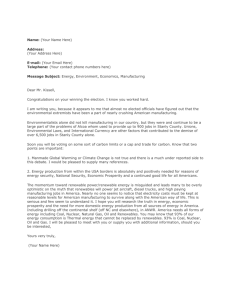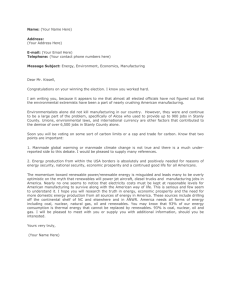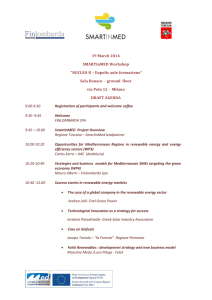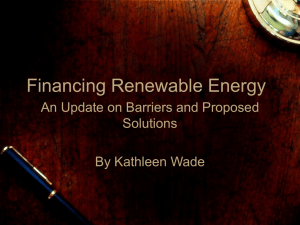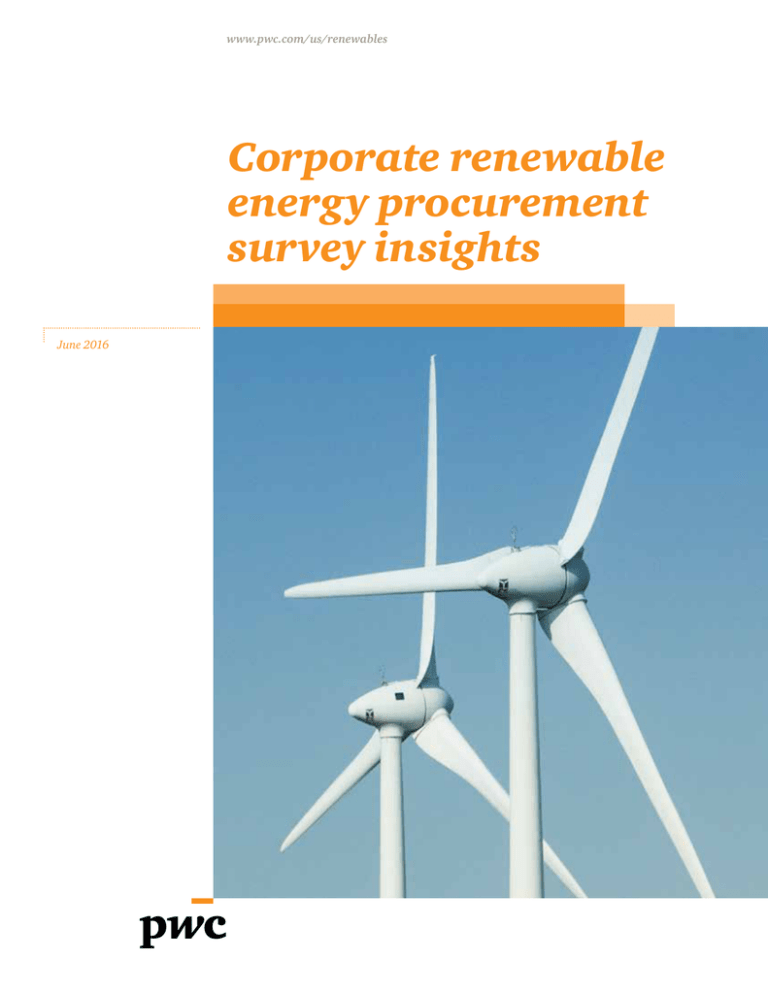
www.pwc.com/us/renewables
Corporate renewable
energy procurement
survey insights
June 2016
Executive summary
One of the biggest developments in the renewable energy marketplace in the last 12–24 months has been
the rapid growth in corporate renewables purchases. Some leading commercial and industrial companies
are now playing an increasingly important role in the evolution of the renewable energy sector. Their share
of renewables is growing, their demands of providers are rising, and their approaches to energy procurement
are becoming more sophisticated.
To better understand what is driving the growth in corporate renewables, we designed a survey of companies
headquartered in the US, most of which have large energy footprints and have purchased renewables in
the past.
Highlights of the survey insights follow:
A strong majority of respondents intend
to purchase in the next 18 months...
• Of the respondents surveyed, 72%
are actively pursuing additional
renewables purchases. And their
appetite for renewables has been
growing: 63% of respondents have
become more inclined to purchase in
the last six months. And among those
who have made a purchase in the past,
an even larger majority (85%) intend
to make additional purchases in the
next 18 months.
• This intent is driven by a desire to
meet sustainability goals and to reduce
greenhouse gas emissions (cited by
85% of those actively pursuing),
generate an attractive ROI (76%),
and limit exposure to energy price
variability (59%).
• Four-fifths of the companies
surveyed are planning to build out
their renewables portfolio with
multiple types of transactions
(e.g., an offsite PPA and an onsite
financial investment).
• While onsite PPAs remain most
popular (selected by 67% of those
actively pursuing procurement), more
than half (58%) intend to purchase
traditional offsite PPAs, and 30% plan
to pursue offsite virtual PPAs. The
responses also point to an increase in
offsite versus onsite purchases.
• When identifying the most important
renewables technologies to their
organization over the next 12–24
months, virtually all respondents
selected solar (96%), while a
majority also cited wind (69%).
Three categories dominated the
ancillary technology options: 59%
or more chose advanced metering,
energy management software, and
energy storage.
The lack of an internal mandate holds a
minority back...
• Among the 28% of respondents who
are not actively pursuing purchases,
the most commonly cited reasons
for not doing so are the lack of a
mandate (61%), an unattractive ROI/
payback (56%), and the length of
contracts (50%).
Note: A traditional PPA (power purchase agreement) is typically a 10–20 year agreement to buy electricity generated from a project that flows directly to the purchaser.
Standard PPAs guarantee the owner of the project a stream of revenue by selling the power at a fixed and often inflation-indexed price to a creditworthy purchaser.
A virtual PPA is a 10–20 year contract by a customer to pay a fixed price for electricity from a renewable energy project where the electricity generated is not physically
used by the customer. Instead, the electricity is sold into the market. These transactions can be structured in different ways, but they usually involve the customer
getting an energy price hedge and the environment attributes of the green power generated.
2
| PwC Corporate renewable energy procurement survey insights
Profile of survey respondents
Company revenue
Energy spend of organization
Level and role of respondents
62% of respondents generate more than
$10 billion annual revenue
Majority of respondents have large energy
footprints—68% spend more than $100M
per year
Over 59% of respondents were director
level or above from the sustainability,
operations, facilities/energy management,
or procurement functions
5%
< $1
billion
26%
Level of respondent
33%
> $50
billion
36%
Other
$1− $10
billion
$10− $50
billion
Vice
President
20% and above
17%
24%
43%
39%
Manager
More than
$250M
Director
Role of respondent
Other
25%
Renewable energy
organization membership
16%
$100M−
$250M
59%
17%
Sustainability
32%
ACORE
only
24%
BRC
only
13%
Both
Procurement
Facilities/
energy
management
Less than
$100M
22%
Operations
5%
59% of respondents are members of
either ACORE, the BRC, or both*
41%
Neither
3%
Industry
Respondents represent a broad range of industries; most prominent is information,
communication, and technology**
23%
14%
Information,
communication,
and technology
* 28% of respondents worked in industries not listed in this chart.
** ACORE=American Council On Renewable Energy; BRC=Business
Renewables Center (of the Rocky Mountain Institute).
Retail and
consumer
11%
Manufacturing
9%
9%
Financial
services
Healthcare
6%
Hospitality
Corporate renewable energy procurement survey insights PwC |
3
Purchase intent
Renewable energy procurement
Changing inclination to
purchase in last six months
28%
The majority of respondents have become
more inclined to purchase renewables in
the past six months
72%
63%
Actively pursuing
Not actively pursuing
Corporate goals
46%
Have renewable energy goals
11%
Have greenhouse gas
emission reduction goal
80%
Drivers of intent to purchase*
Attractive ROI/
payback
59%
Enhance reputation
of organization
54%
56%
Length of contracts
is problematic
Capital funding is
not available
33%
22%
Keep up with
competitors
9%
Uncertainty of future
electricity prices
Other
7%
Financing/contracting
is too complex
11%
Unpredictable
government policy
11%
Technology is too
complex/unreliable
Other
* Respondents were asked to list their "top 3" reasons
| PwC Corporate renewable energy procurement survey insights
5%
Become
less
inclined
50%
Key decision makers
don't see benefits
13%
No change
in
inclination
61%
Unattractive ROI/
payback
76%
Limit exposure to
energy price variability
Reduce outage
or supply risk
No mandate/
not strategic
85%
32%
72%
Drivers for lack of intent to purchase*
Meet sustainability
goals/reduce greenhouse gas emissions
4
Become
more
inclined
17%
6%
17%
A corporate mandate
(existing or lack thereof) is
the most critical driver. While
the “actives” have been
able to achieve acceptable
payback, the “not actives”
have not yet identified
projects or contract structures
that meet their needs.
Intended transaction mix
Technologies
Breakdown of intended
future purchases*
Number of transaction
types*
Onsite PPAs remain the most popular
procurement type (67%) followed by
traditional offsite PPAs (58%)
Four-fifths of respondents are pursuing
more than one type of transaction (e.g.,
onsite direct investment and offsite PPA)
Most important renewable
technologies over the next
12–24 months
Most respondents believe solar and wind
will dominate their purchasing decisions
67%
58%
47%
27%
47%
4+
16%
22%
20%
1
31%
2
3
Direct
install
PPA Traditional Virtual Financial
PPA
PPA investment
Onsite
Offsite
Changes in purchasing—past versus future
In the past, procurement skewed toward onsite purchases. However, future purchase
intent seems to be balanced between onsite and offsite options, which may be driven
by an increased appetite for virtual PPAs—a relatively new financing option
89%
80%
80%
60%
69%
31%
18%
16%
Solar
Wind
Fuel
cells
Biomass
Waste
heat
11%
7%
5%
0%
7%
Waste
-toenergy
Run-ofriver
hydro
Landfill
gas
Tidal/
wave
Other
Most important ancillary
technologies over the next
12–24 months
Respondents believe technologies for
measuring and monitoring energy will be
most important to their organizations
62%
57%
48%
46%
96%
67%
Advanced
meters
59%
Onsite
Past purchases
Both onsite
and offsite
Offsite
RECs
Energy
storage
63%
Energy management
software
30%
Combined
heat and power
Intended purchases in the next 18 months
24%
Microgrids
* Data only from those respondents that intend to purchase in the next 18 months.
7%
Other
Corporate renewable energy procurement survey insights PwC |
5
Vendors
Decision making
Use of third party advisor,
consultant, or broker
Renewable solution
vendor preference
Decision makers for
renewable purchases
A vast majority (81%) of companies are
planning to engage a third party or are
considering doing so to help develop their
procurement strategy
The majority of respondents will seek
to purchase from a developer, while
half will seek to work with a utility
Renewables procurement is a highly
cross-functional process: for threequarters of the respondents, at least two
functions are involved in the decision,
and more than half of the companies
require three or more decision makers.
More than 60% of respondents said
that Facilities/energy management
and Sustainability are the key decision
makers; Finance, Operations, and
Procurement play a significant role, too
Renewables
developer
(full service)
19%
50%
Utility
No
48%
93%
Energy
management
service provider
Yes
33%
43%
1
Vendor of
renewable
energy equipment
Maybe
Other
22%
41%
3+
7%
56%
Number of
functions
responsible
2
22%
How vendors can make it easier for customers
Customers want a more streamlined experience that suits their contracting terms
and offers them a range of options across the lifecycle of the project
Facilities/energy management ................... 63%
Sustainability .............................................. 61%
31%
Use buyer's terms, not 'standard' contracts
Offer broader portfolio of procurement options
(e.g., onsite projects, offsite projects, REC
purchasing)
27%
Provide one-stop, turnkey solutions (including
financing, installation, and maintenance)
Offer broader portfolio of energy services (e.g.,
efficiency, LED lighting, demand response)
Other
6
| PwC Corporate renewable energy procurement survey insights
Finance....................................................... 57%
Operations.................................................. 54%
Procurement............................................... 48%
22%
Vendor of
renewable
energy equipment
3%
17%
Learnings from past purchasers
Have they purchased
renewables?
Quantity of renewables
purchased
Most respondents have already purchased
onsite or offsite renewables
Over half of the purchasers have made significant (>10MW) investments in at least
one type of renewable energy*
33%
71%
Have
purchased
renewables
20%
11%
<1
MW
25%
1−10
MW
10−50
MW
> 50
MW
Building internal support
is the biggest hurdle in
the renewable energy
procurement process…
…while tracking the
savings and telling
the story are the toughest
ongoing challenges.
However, even with the
challenges, past purchasers
have a high intent to
purchase going forward. Most difficult step
Ongoing challenges**
Purchase intent for next 12 to 18 months
Ongoing challenges with economics and
payback...
8%
11%
Identifying
a project
19%
Other
20%
22%
Defining a
stategy
Negotiating
the contract
28%
Building
internal support
• “Tracking the actual financial savings”
• “Adjusting to the impacts of dropping
fossil fuel prices”
• “Explaining when the contract settles
against us”
• “Tracking the ROI, given the
complicated contract terms”
…and telling the story
• “Understanding the rights to
environmental claims”
• “Understanding the broader benefit to
the company”
• “Determining how to expand to
additional locations, developing the
business case for future projects,
and defining the path forward to
100% renewables”
• "Telling the additionality story"
*11% of respondents did not provide information on the quantity of renewables purchased
**Anonymous quotes from respondents
No plans
for future purchases
7%
Planning
additional purchases,
but no current action
85%
Actively pursuing
additional purchases
Corporate renewable energy procurement survey insights PwC |
7
www.pwc.com/us/renewables
About PwC’s Renewable Energy Practice
At PwC, we offer a broad and deep set of assurance, tax, and advisory services to meet the business
challenges of, and add value to, the dynamic renewable energy sector. Our broad network of industry
professionals provides us with an in-depth understanding of key industry issues related to strategy,
policy and regulation, operations, sustainability and climate change, risk, technology, finance, tax and
incentives. Our clients include leading utilities, developers, technology providers, commercial and
industrial companies, government entities, and financiers.
Contacts
Thank you
George Favaloro
Managing Director
george.favaloro@pwc.com
617-530-5095
Thank you to ACORE and the BRC for
providing support and facilitation.
Brian Carey
Principal
brian.d.carey@pwc.com
408-817-7807
Debi Gerstel
Cleantech Chief of Staff
debi.gerstel@pwc.com
206-398-3607
ACORE is a national non-profit
organization dedicated to advancing
the renewable energy sector through
market development, policy changes, and
financial innovation. ACORE’s Corporate
Procurement Working Group simplifies
renewable procurement to provide
realistic options for corporate players
across the economy.
Rocky Mountain Institute's Business
Renewables Center (BRC) is a
collaborative platform comprised of over
120 corporate buyers, project developers,
and intermediaries, collectively
representing 90% of the offsite corporate
renewables market, that seeks to
streamline and accelerate corporate
purchasing of renewable energy.
© 2016 PwC. All rights reserved. PwC refers to the US member firm or one of its subsidiaries or affiliates, and may sometimes refer to the PwC network. Each member firm is a separate legal
entity. Please see www.pwc.com/structure for further details. PricewaterhouseCoopers has exercised reasonable care in the collecting, processing, and reporting of this information but has not
independently verified, validated, or audited the data to verify the accuracy or completeness of the information. PricewaterhouseCoopers gives no express or implied warranties, including but
not limited to any warranties of merchantability or fitness for a particular purpose or use and shall not be liable to any entity or person using this document, or have any liability with respect to this
document. This report is for general purposes only, and is not a substitute for consultation with professional advisors. 159110-2016 br

